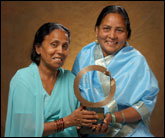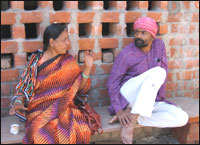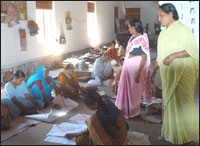
Shukla (left) and Bee.
Photo: Goldman Environmental Prize
On the night of December 2, 1984, in the central Indian city of Bhopal, a massive poisonous gas leak from a Union Carbide pesticide factory killed 8,000 people. Over the course of 20 years, the infamous disaster has caused an estimated 20,000 deaths, countless birth defects, and a litany of other serious health problems.
“The young women who were exposed while they were infants have different kinds of menstrual disorders, and some are going through early menopause — at age 25 or 30,” says Bhopal survivor Rashida Bee. Bee, 48, and fellow disaster victim Champa Devi Shukla, 52, want justice for those who survived that December night — and for the younger generation that continues to suffer its consequences.
The two women are helping to lead an international campaign against Dow Chemical and its subsidiary Union Carbide. In 1999, they and other disaster victims filed a class-action lawsuit against Union Carbide, a case that is still making its way through the U.S. court system. In 2002, Bee and Shukla organized a 19-day hunger strike in New Delhi, demanding that former Union Carbide CEO Warren Anderson face a criminal trial in Bhopal. They also called for Dow to provide long-term health care for survivors and their children, clean up the former Union Carbide site, and supply economic support to survivors who can no longer work due to illness. That action has been followed by hunger strikes, protests, and rallies by activists around the world, an outcry that Forbes magazine has blamed for a drop in Dow’s stock price. In May, Bee and Shukla plan to take their demands to Dow’s shareholders meeting in Michigan.
The pair shared one of the six 2004 Goldman Environmental Prizes, awarded in a ceremony in San Francisco, Calif., on April 19. Grist spoke to Bee through a translator.
I realize this may be difficult for you, but would you describe some of your memories of the Union Carbide disaster?
It is difficult to describe all that we went through that night in words, but I will speak briefly. We were all sleeping that night, and suddenly in the middle of the night the children woke up coughing. They said they felt like they were being choked, and we felt that way too. One of the children opened the door and a cloud came inside — we all started coughing violently, as if our lungs were on fire, and our eyes were watering. One of the kids, who had gone outside, said everyone was running away and that we all must run away. We did not know at that time that it was poisonous gas from Union Carbide. People were saying that a warehouse full of red chiles had caught fire, because that was how it felt, terribly irritating. Outside, there was a commotion, with people running everywhere. Our family was separated, and I with my husband and father started running. We could only run for half a kilometer because we were inhaling the gas. Our eyes were so swollen that we could not open them — when we pried our eyes open, all we saw were dead children and people all around us. After running half a kilometer we had to rest. We were too breathless to run, and my father had started vomiting blood, so we sat down.

Bee in front of a clinic that treats people still suffering from effects of the Union Carbide gas leak.
Photo: Andy Blac
How have you and your families been affected by the gas exposure?
At the time [of the gas leak] all of us had to be hospitalized, we were all having such severe problems. Some of my family members were missing for a few days, and I had to look at thousands of dead bodies to find out if they were among the dead. The problems were very intense and acute at that time, but we did not know that the problems would last for so long. My father and other people in my family have had five different kinds of cancers. The young women who were exposed while they were infants have different kinds of menstrual disorders, and some are going through early menopause — at age 25 or 30. So often they cannot produce children, and the children they do produce often have birth defects. This is not just in my family but all around in the community. Many people have tuberculosis because the gas exposure caused damage to the immune system. So these problems continue.
I understand your activism began when you founded an independent union in your workplace. What convinced you to do this?
When I came out of our household after being isolated — that isolation was according to traditional Islamic custom — I started working. [Editor’s note: Bee abandoned this custom because the male wage-earners in her family were too sick to work.] I met with women who were in similar or worse situations. I realized that it was not just the problem of my family, but that hundreds and hundreds of other families have these problems. I realized that we could and must come together, that this was a problem common to all of us.

Bee and Shukla oversee women workers at a stationery manufacturer that employs Bhopal survivors.
Photo: Andy Black.
I imagine that it’s unusual for women in your community to become political activists. How have your friends and neighbors reacted to your work?
I’ve been fortunate to have a husband who provides full support to me and is interested in what I do. I have support in my family and in my neighborhood. People are always surprised at the things I do — they wonder how a woman with no education and a background of poverty does what she does — but they have come to appreciate that what I am doing is not just for Bhopal but has meaning for the whole world. Now I am hopeful that more people from Muslim families, at least in my neighborhood, will realize that they should not keep women in the confines of the house.
What can be done to prevent similar disasters?
To insure that Bhopal doesn’t occur anywhere else, we must ensure that justice is done in Bhopal. If there is exemplary punishment of the corporation and its officials, then other corporations will think twice before imposing risks on the life and health of ordinary people. We must spread the word of Bhopal, and make sure that legal responsibility for the disaster is fixed on the corporation that is responsible.
What keeps you going?
It is the suffering of people around me that drives me to do what I am doing. When I realize that families are starving, when I realize that babies are nursing on poisoned breast milk, I know I cannot stop and must continue with this.
What will you do with the prize money?
We will put all of this money into a trust, and the trust will provide medical help to babies who are born with defects. The trust will also provide employment for people who cannot work because of sickness. We will also set up a smaller award in our own country for ordinary people who fight corporate crime.
What does the prize itself mean to you?
This award, it affirms our struggle and makes the issues we are raising credible. It brings out the truth in our campaign. Dow has been trying to portray us as a fringe group with unreasonable demands. This award nails that lie, and shows that our campaign and demands are based in truth.


